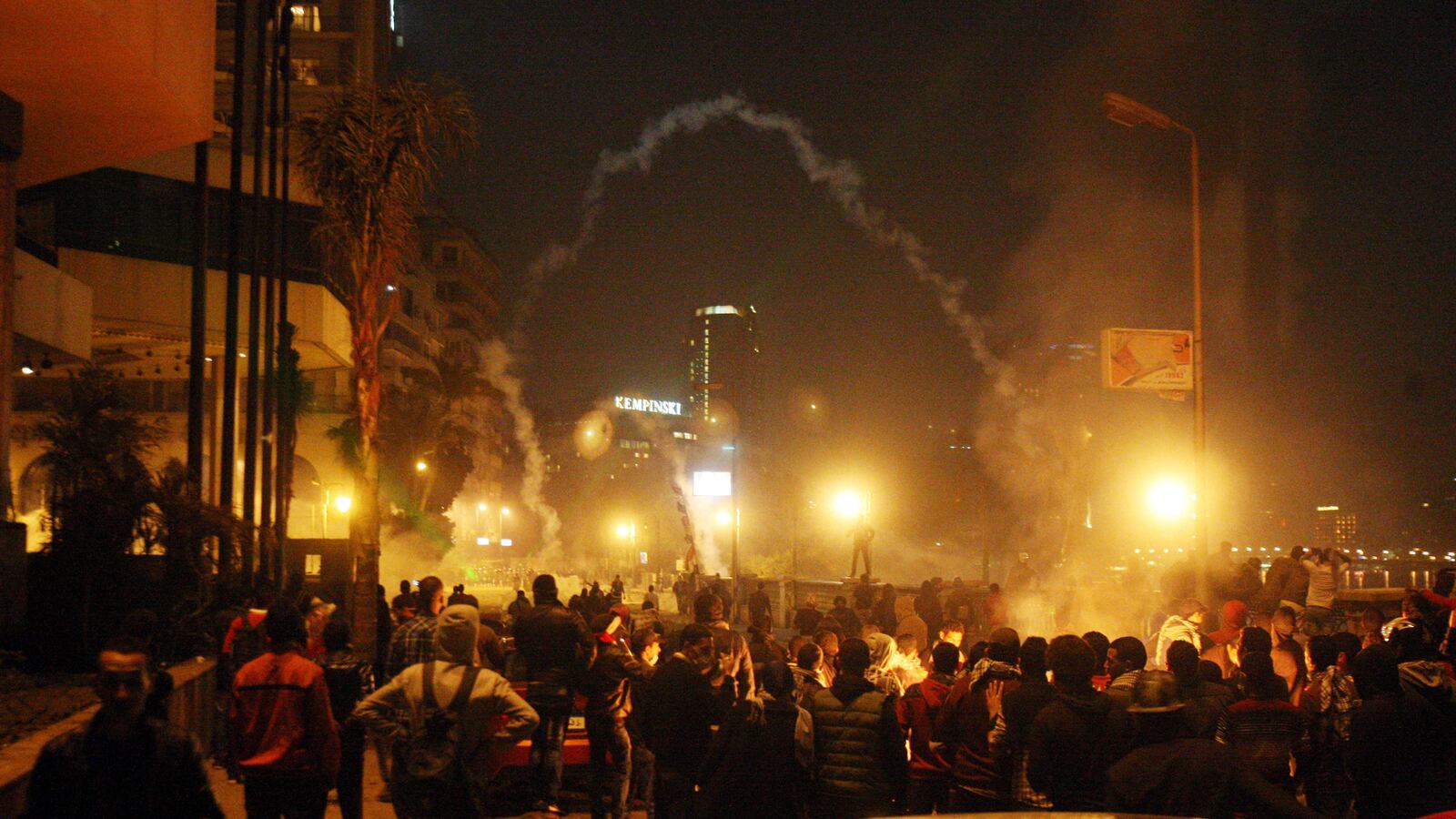
Egyptian demonstrators hurled rocks and clashed with security forces in the early hours Monday, many in defiance of a 30-day state of emergency issued by President Mohamed Morsi in three governorates amid escalating violence following the sentencing of soccer fans in the Mediterranean city of Port Said.
The Egyptian courts handed down a ruling against almost two dozen soccer fans Saturday—known locally as the “ultras”—igniting a wave of chaos in the streets nationwide and opening a new chapter in Egypt’s volatile revolution. A day after the two-year anniversary of Egypt’s popular uprising, the courts announced the first in a series of verdicts in Egypt’s deadliest-ever soccer riots, sentencing 21 fans of the Port Said team to death.
The response nationwide was instantaneous. Family members and devout soccer fans, outraged by the sentences, stormed the prison holding the defendants and set fire to buildings and cars around Port Said. Ultras rushed the Suez Canal port, threatening to shut down the waterway. They set fire to local Muslim Brotherhood offices—a slight to the president who is a member of the group. The death toll has topped 50 in two days of violence mainly in Port Said, according to the Health Ministry.
The curfew is effective from 9 p.m. to 6 a.m., in the governorates of Port Said, Ismailiya, and Suez. “I always said I’m against any exceptional measures, but I also said I might resort to such measures if I had to. I may even do more for the sake of Egypt—it’s my duty,” Morsi said in a late-night televised address Sunday. “There is no going back on freedom, democracy, and the supremacy of the law.”
“This is the perfect situation for Morsi,” said Mohammed Ramzi, 19, a Cairo resident who identifies himself as an ultra. “We are bleeding in the streets, and now [Morsi] has an excuse to send his thugs after us the same way Mubarak did. Still, it is a long road until we get justice in this country.”
The deadly incident that sparked this new upheaval occurred on Feb. 1, 2012, at a time when intolerance for the then-ruling military council, which assumed power after the fall of former president Hosni Mubarak, had reached its peak. The match between Cairo’s Ahly Club and the Port Said Masry Club ended in mayhem, after fans of the Port Said team raided the field, clashing with their opponents. Almost 72 people—most of them fans of the Cairo team, were killed in the riots. Police had done almost nothing to quell the violence, leading many to accuse the military of purposely turning a blind eye. In the end, 73 people were arrested in connection with the deaths. Verdicts for the remaining 52 defendants, including nine security officials, are scheduled for March.
According to Ziad Aki, a commentator for the Daily News Egypt, “this trial is a charade designed by the army and implemented by state institutions to find scapegoats while the guilty get decorated.” He added: "It is premature to think that justice has been served for those who died."
While Port Said fans voiced their anger, the verdicts triggered massive celebrations in Cairo from Ahly Club fans, who stormed the stadium, singing songs and chanting victory slogans. However, what began as an event tied to the young soccer community has since spread amid growing discontent for the government of Morsi, who just barely clinched the presidency in an election last June.
In his address Sunday, Morsi extended another invitation to key representatives from 11 political parties to the presidential palace for dialogue, as well as several leading political figures, amid continued violence nationwide. But opposition members seemed eager to capitalize on the momentum building in the streets, with Mohamed ElBaradei’s National Salvation Front urging renewed protests on Friday to revive the fight over the country’s controversial Constitution, which Morsi and his allies successfully passed last month in a referendum, though it was marred by accusations of fraud.
While Saturday’s violence highlights the increasing polarization in Egypt—which only two years ago united to topple a dictator—it also demonstrates the growing power of this group of young men, known as the ultras. Organized and unified, arguably more than any other opposition group, this bunch of hooligans played a key role in the popular uprisings two years ago, often thrusting themselves on the front lines when battles with security forces grew fierce. The group is no stranger to confrontations with security forces and used to face off with the police long before the idea of an Arab Spring seemed feasible. They were highly represented in the Feb. 2, 2011, clashes now known as the “Battle of the Camels”—when protesters and security forces (many riding camels and horses) faced off in a bloody battle in Tahrir Square, leaving some 300 people dead.
Still, many non-ultras are concerned that the decision was merely taken to placate protesters by showing that the state was taking an active role to uphold justice, regardless of whether or not the defendants are, in fact, guilty. “I don't know what the ultras and people are happy for” Gigi Ibrahim, a prominent socialist activist, said via Twitter. “Innocent people will be hanged by law while the real murders are free.”
Yehia el-Gammal, a veteran revolutionary activist, said the sentencing just sparked a renewed sense of anger among the “angry young people” who are growing increasingly frustrated with the country’s deteriorating economy, the Constitution, and crumbling security. "People are realizing this is a political thing. They didn’t at first,” he said. “And everyone is angry. Even the cab driver who drove me home from Tahrir was angry.”
—With Mike Giglio






